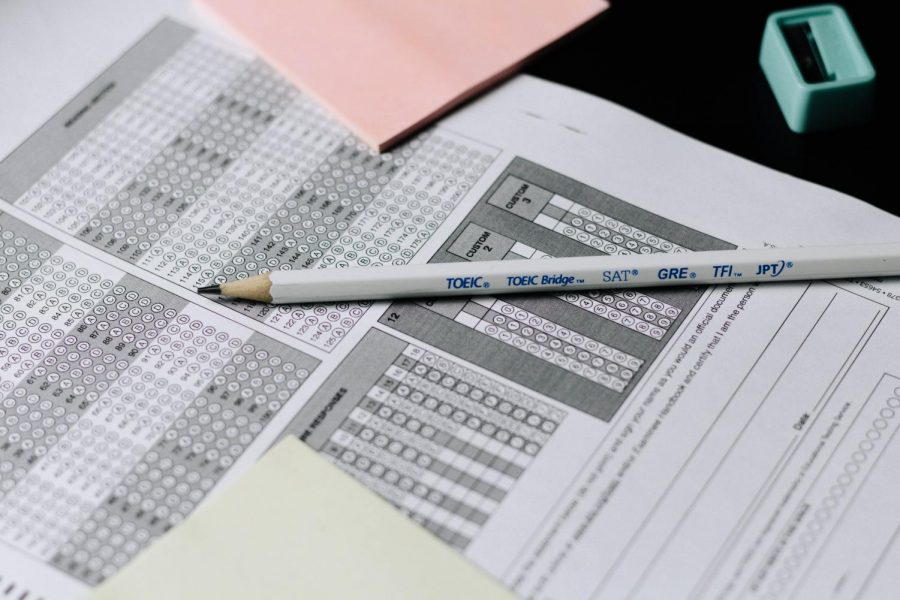- Best of SNO
- Community
- COVID-19 Coverage
- Issue 4: News 2020-21
- News
- School Life
- SUMMER OVERHAUL 2020-21
- SUMMER OVERHAUL 2020-21 Best News
- Ω Issue 4: 2020-21
SAT cancellations raise questions about the future of standardized testing
Photo by Nguyen Dang Hoang Nhu (@nguyendhn) on Unsplash
Due to COVID-19, SAT testing sites have been forced to cancel tens of thousands of tests, sparking discussions about the future of standardized tests in the college admissions process.
January 20, 2021
Update: The College Board announced on Jan. 19 that it will no longer be offering the SAT subject tests or optional essays in order to “simplify demands on students.”
After the COVID-19 pandemic forced the College Board to cancel over 735,600 SAT registrations in fall 2020 alone, the Tri-Valley community is beginning to question whether standardized testing will continue to be a central part of college applications in the future.
Beginning in March 2020, the spread of COVID-19 has caused many testing sites to cancel registrations. Recently, according to a College Board report, 124,000 of the 383,000 SAT and SAT Subject Test registrations for the December test date were canceled as of Nov. 30, 2020. As the college application period comes to an end, these cancellations have created significant problems for students wishing to obtain scores for college applications.
“It has been quite interesting, because for certain colleges they are basically saying that you do not need to take it to apply, but if you do take it, you have to submit your results, which can be disadvantageous if you end up taking it and messed up,” DVHS senior Alexander Ellicot-Pesic explained.
At DVHS, many students and parents continued to search for open testing locations in order to boost their standardized test scores, believing that it would benefit them in the college admission process.
“Yes, they [were] one hundred percent still trying to find where they can take the test,” DVHS College and Career Coordinator Jennifer Wright explained. “I have seen people fly to multiple locations to be able to still take it multiple times, even though I don’t know of a school that is not test-optional.”
Ellicot-Pesic signed up for several tests out-of-state in order to obtain scores for colleges that required the SAT.
“I have had tests canceled in March, May, June, August and September,” he explained. “I have had tests in Oregon and Nevada and some of them have been shut down due to the coronavirus, others because of the wildfires.”
After facing all of these cancellations, Ellicot-Pesic found an SAT testing center in Rhode Island that was open for registration. Along with a test he took in Reno, Nevada, Ellicot-Pesic traveled far for the SAT.
“I ran into people from the Bay Area in Rhode Island, which was crazy because I think everyone around here is just trying their best to take it,” he explained.
While cancellations have created stress for many students such as Ellicot-Pesic, other students like DVHS junior Eric Lin have felt mixed feelings. Although he signed up for three tests including one in Oregon, Lin was able to relax considering that his tests were eventually canceled.
“For the SAT, [the cancellation] was a bit of a relief since it meant more time to study,” he recalled. “I also really did not want to go to Oregon because that’s just way too far.”
Widespread test cancellations have forced many universities and colleges to modify their admission procedures to be fairer to students affected by cancellations. In May, the University of California Board of Regents approved changes to their admission requirements, making all SAT and ACT test scores optional until fall 2024 in a unanimous vote.
Some, like Wright, viewed these changes as a step in the right direction for admission procedures.
“At our school, there’s so much pressure put on both grades and test scores, that to alleviate one of those puts the focus back where it should be, on … being well-rounded, pursuing relevant activities outside of the classroom and focusing on well-written essays that really talk about the kind of person that the applicant is,” she said.
Even though many feel that the decreased influence of standardized testing on college decisions will be permanent, Chee Liang Hoe, president of Cita Education, a tutoring center holding SAT preparation classes all year long, urges his students to continue studying for the tests as if they were still going to take place.
“I told [my students] that since they’ve come so far, by practicing and by taking the test and doing well on the test, it will help them put something on their mental map because they actually accomplished something,” he explained.
At the Huntington Learning Center in Danville, owner Irum Zaidi has had similar experiences with students losing the motivation to continue studying for tests. As a business owner of a center that prepares students for SAT, Irum Zaidi reflects on how the multiple test cancellations have affected enrollment in tutoring sessions.
“I have not seen that many students coming in … the motivation is not there,” she said. “Plus, now parents don’t know how to react.”
The question of whether these changes will be permanent is up to debate. Liang Hoe believes that tests will serve as motivation for students to continue studying and as a tool for comparing students with very similar applications otherwise.
“I do think that it’s something that is good to do … without the SAT, it is very difficult to compare objectively between two students,” he said. “Like someone who gets an A from this school, how do you compare them to another student who got an A in a similar subject?”
Likewise, Lin believes that tests will remain a major part of the admission process at colleges that are not necessarily among the best in the nation.
“Although it may not be a good way to distinguish people from each other at the best schools, I still think that … it’s still decent for distinguishing the average student,” he explained.
On the other hand, Wright believes that the test cancellations are just a part of a larger movement towards test-optional admission processes.
“It’s not me saying [colleges] should [transition to test-optional admissions], I’m saying I think they will,” she said. “Every year, hundreds of schools are going test-optional anyway.”
Similarly, Zaidi believes that the change in motivation she has seen in her students will have a lasting impact.
“Nothing is going to go back to normal,” she explained. “I guess we have to define the new norms and see what is going to happen. Tests are not going anywhere, but I don’t think they are going to be as intense as they are right now.”
The next SAT test date is set to be on March 13.







